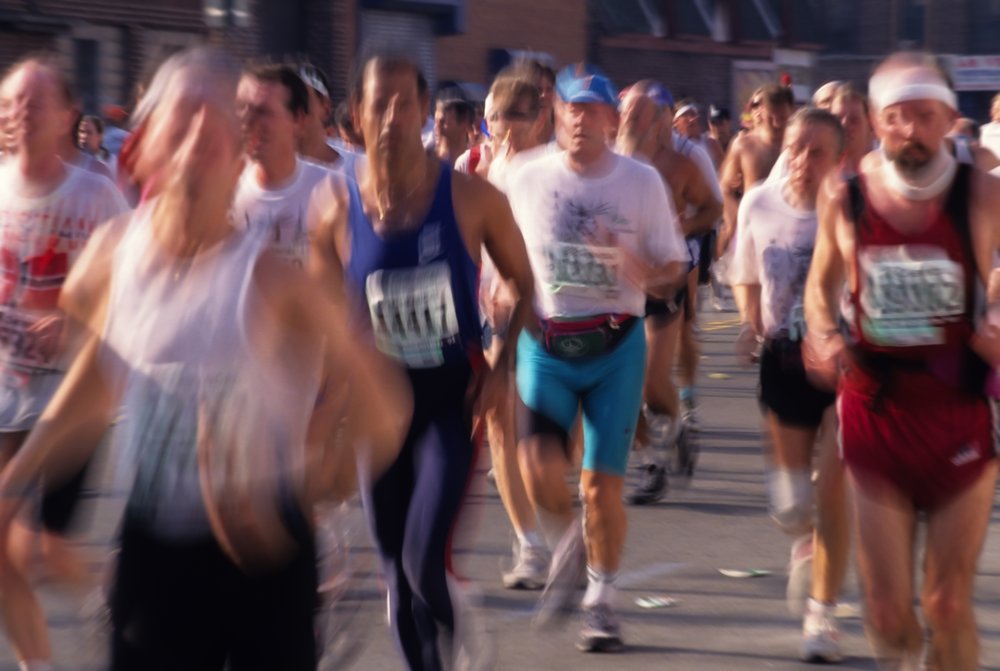NYC's summer heat can be brutal. Marathon trainees need to take care.
July 6, 2025, 7:01 a.m.
Runners always need to watch out for the heat, but that goes double for those who plan on going the distance.

Marathon training season is here, but so are dangerous temperatures. But experts say there are ways to safely hit the pavement when heat waves roll in.
Although the New York City Marathon isn’t until November, training regimes start around now, especially for more casual runners. While that gives ample time to warm up to distance runs later in the summer and fall, early training days in the city come with excessive heat.
Temperatures on some days this summer already have already crept into the 100s; the heat has been life-threatening. This weekend, they're hanging in the high-80s to low-90s. This means runners should find cool, indoor training areas, but experts say going outside and touching grass (or concrete) is doable — if athletes are smart about it.
“You need to give yourself time to get used to the weather,” said Steve Mura, runner training and education lead at New York Road Runners. “10 to 14 days, say two weeks to get used to it. Give yourself grace.”
Mura equates training in the heat to running in the winter: While the cold of a December morning initially bites a runner to the bone, it gets easier to bear as winter goes on and the runner racks up more miles. The same slow and careful approach applies to acclimating to the heat.
He also says the time of day will make or break long-term training goals during a hot summer.
“Run early when run when it's coolest out,” Mura said. “So if you do have the ability to run before the sun goes up, or when the sun goes down, do. And avoid noon to 4 p.m., when it's hottest.”
Ultimately, the coach says that as the summer heat goes down, so will a runner’s splits, or mile times. Once an athlete is used to the heat, and smart about hydrating and recovery during training, mile times will drop.
“I guarantee every single runner that mile per pace, if that's your goal, will come down,” Mura said. “In these hot days, it's respecting the weather and respecting you as a runner and knowing that your health is more important than skipping a day because of the heat — which is totally fine, in every runner's book, in every coach's book.”
While the New York Marathon isn't until Nov. 2, marathon season starts earlier in the fall. That means the summer is time for people to not only build up their miles with varying distance runs, but also their strength.
That’s why Dr. Sanjai Sinha, an associate professor and primary care physician at Mount Sinai Hospital, and an avid runner himself, said training for a marathon is more than just running — crosstraining is also necessary.
“You can exercise indoors. Even if it's not running, you can keep your body active and limber if you can cross train on these days,” Sinha said. “These would be a great opportunity to lift or to do other cardio workouts. You'll get your heart working, you'll get your blood circulating. It's all good for your health, and if you've been training, then a one-week hiatus is not going to kill you, not one iota.”
Sinha says hydration is key. Not drinking enough water can harm a runner's performance and degrade their body, making recovery take even longer. It can also lead to more serious ailments, like nausea, heart palpitations and heat stroke.
“Consider hydrating significantly more than you normally would,” Sinha said. If your urine isn’t clear, that’s a sign you’re likely not hydrating enough.
Although training to a point of satisfaction is important, listening to your body and knowing when to take a break is just as crucial — as the doctor orders.
“ It's absolutely appropriate to feel a little bit of anxiety when you're on a schedule and you have to go off your schedule for a certain number of days and you feel like you’re going to lose some of your strength and some of your rhythm,” Sinha says. “ You have to listen to your body and you have to adjust your routine, but you'll get right back into it.”
Your NYC guide to staying safe, cool and alive during the summer's first heat wave